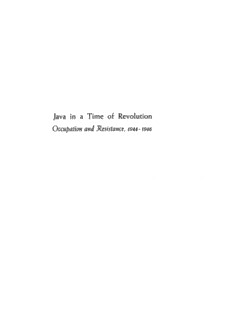
Java in a Time of Revolution: Occupation and Resistance, 1944-1946 PDF
509 Pages·1972·49.117 MB·English
Most books are stored in the elastic cloud where traffic is expensive. For this reason, we have a limit on daily download.
Preview Java in a Time of Revolution: Occupation and Resistance, 1944-1946
Description:
With remarkable scope and in scrupulous detail, Professor Anderson analyzes the Indonesian revolution of 1945. Against the background of Javanese culture and the Japanese occupation, he explores the origins of the revolutionary youth groups, the military, and the political parties to challenge conventional interpretations of revolutionary movements in Asia. The author emphasizes that the critical role in the outbreak was played not by the dissatisfied intellectuals or by an oppressed working class but by the youth of Indonesia. Perhaps most important are the insights he offers into the conflict between strategies for seeking national revolution and those for attaining social change. By giving first priority to gaining recognition of Indonesian sovereignty from the outside world, he argues, the revolutionary leadership had to adopt conservative domestic policies that greatly reduced the possibility of far-reaching social reform. This in-depth study of the independence crisis in Indonesia, brought back to life by Equinox Publishing as the first title in it's Classic Indonesia series, also illuminates the revolutionary process in other nations, where wars for independence have been fought but significant social and economic progress has not yet been achieved. ABOUT THE AUTHOR Benedict Anderson is one of the world's leading authorities on South East Asian nationalism and particularly on Indonesia. He is Professor of International Studies and Director of the Modern Indonesia Project at Cornell University, New York. His other works include Imagined Communities: Reflections on the Origin and Spread of Nationalism and The Spectre of Comparisons: Nationalism, Southeast Asia, and the World.
See more
The list of books you might like
Most books are stored in the elastic cloud where traffic is expensive. For this reason, we have a limit on daily download.
